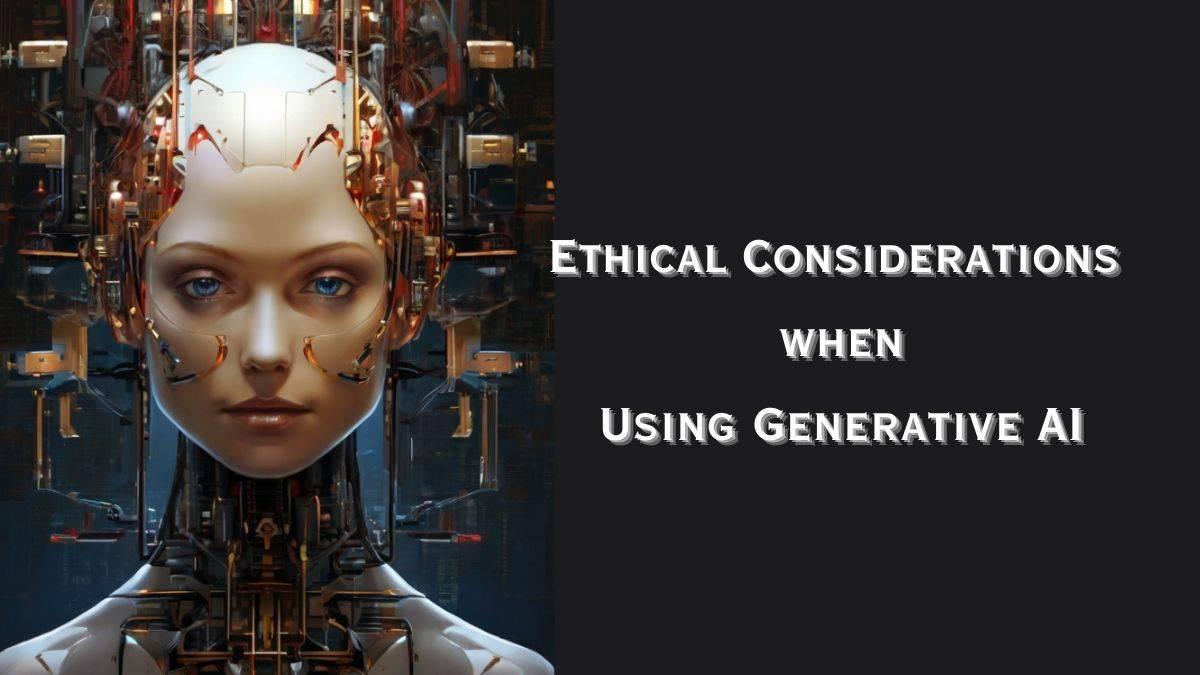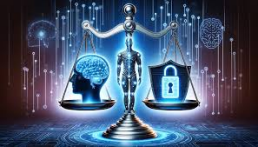Ethical Considerations When Developing Generative AI

Generative AI: What Is It? 
One kind of artificial intelligence technology used to create content is called generative AI. Text, audio, images, and other synthetic data are all included in this. Since 2023, a large number of generative AI technologies have gained enormous popularity. Midjourney AI, Dall-E, Leonardo.ai, ChatGPT, Bard, Claude AI, Synthesia, and HeyGen are a few well-known examples of generative AI  tools. Learn about machine learning and artificial intelligence in general. By 2024, the generative AI industry is expected to grow to a size of up to the US $66.62 billion. The generative AI market is predicted to develop at a 20.80% annual pace (CAGR 2024–2030), reaching a value of US$207.00 billion by that time. The application of Generative AI (GenAI) has revolutionized numerous sectors. Although the current applications and results are fascinating, Generative AI offers many more potential benefits, particularly in customer operations, marketing and sales, and research and development. Even though many organizations want to use GenAI, ethical issues, and obstacles need to be resolved for adoption to be responsible and successful. GenAI systems can learn from their input data and hold out hope for a better future thanks to deep neural networks and machine learning algorithms. In a Salesforce poll from 2023, 33% of IT leaders said that generative AI is their top concern.
tools. Learn about machine learning and artificial intelligence in general. By 2024, the generative AI industry is expected to grow to a size of up to the US $66.62 billion. The generative AI market is predicted to develop at a 20.80% annual pace (CAGR 2024–2030), reaching a value of US$207.00 billion by that time. The application of Generative AI (GenAI) has revolutionized numerous sectors. Although the current applications and results are fascinating, Generative AI offers many more potential benefits, particularly in customer operations, marketing and sales, and research and development. Even though many organizations want to use GenAI, ethical issues, and obstacles need to be resolved for adoption to be responsible and successful. GenAI systems can learn from their input data and hold out hope for a better future thanks to deep neural networks and machine learning algorithms. In a Salesforce poll from 2023, 33% of IT leaders said that generative AI is their top concern.
Aside from the technology benefits, though, the idea of GenAI also causes a lot of controversy because of ethical questions surrounding its application. These worries hinder the broad and moral application of generative AI systems. We will discuss the ramifications of these worries in this blog and offer a thorough framework for ethical GenAI development that may be used as a guide to lessen the ethical concerns related to generative AI systems.
Overview of Ethical Concerns
The ethical issues surrounding can use of GenAI systems are complicated due to their diverse character. To avoid abuse and alleviate worries about the security of private information, generative AI must be used ethically. 
79% of IT leaders are worried about the security concerns associated with generative AI, per the same Salesforce poll. The following issues are brought up by the growing use of GenAI:
- GenAI algorithms’ biases
- The data-centric nature of GenAI raises privacy concerns
- Transparency is lacking
- Laws’ incapacity to keep up with advancements in GenAI
The complex challenges that are involved in deploying GenAI systems will continue to tarnish the benefits that these systems provide unless these intricate problems are properly considered and resolved.
Privacy In the Era of GenAI:-
Innovations such as GenAI are  essential to the success of businesses. To lessen the potential harm the solution may do, businesses must take safety, ethics, and trust into account before adopting the solution. Many customers respond negatively when they believe that many of the newest technology tools violate their privacy. Consumers are curious about where the boundaries will be between their privacy and a company’s business demands, especially in light of the increasing use of facial recognition software and GenAI, which uses past interactions to comprehend the current context and prepare responses. There are new privacy concerns associated with generative AI. Consumers are curious about:
essential to the success of businesses. To lessen the potential harm the solution may do, businesses must take safety, ethics, and trust into account before adopting the solution. Many customers respond negatively when they believe that many of the newest technology tools violate their privacy. Consumers are curious about where the boundaries will be between their privacy and a company’s business demands, especially in light of the increasing use of facial recognition software and GenAI, which uses past interactions to comprehend the current context and prepare responses. There are new privacy concerns associated with generative AI. Consumers are curious about:
● How is data entered into GenAI put to use?
● In what location will it be kept?
● Who is the owner of my data?
● Is it able to be sold, shared, or kept indefinitely?
● Who gets it if it’s sold or shared? Can I withdraw?
These are all important questions to answer. When responding to inquiries from customers about data accessibility, privacy, and security, responsible enterprises need to consider their options carefully.
Building trust requires finding a balance between the adoption of GenAI and protecting privacy.
What Are Some Moral Factors to Take Into Account While Using Generative AI? 
When utilizing generative AI, the following points emphasize some ethical considerations:
1. Production of Dangerous Content
Generative AI can build anything according to the directions because it creates material based on prompts. This implies that anyone can generate anything with ease if they abuse the tools to create unethical stuff. Such immoral inventions may be detrimental to society.
Using Generative AI: Ethical Considerations The ethical rules listed below can be adhered to:
● Create Ethical Structures: Clearly define ethical standards and best practices for generative AI developers and users, emphasizing accountability, openness, and compatibility with human values.
● Governmental Directives: Establish laws that make users and developers responsible for the improper use of generative AI and outline potential legal consequences.
● Industry Standards and Self-Regulation: Promote cooperative efforts among AI industry participants to establish guidelines and encourage ethical AI development and application.
2. False or misleading information
The datasets used to train generative AI models come from a variety of sources and may contain flaws. In certain circumstances, these models might produce data that is false in fact. It’s possible that these models unintentionally present false claims. Generative AI technologies like Bard and ChatGPT make note of this is in the footer to make sure users confirm this information with reliable sources.
Using Generative AI: Ethical Considerations the ethical rules listed below can be adhered to:
● Explicit limits and disclaimers: Make explicit any warnings on the limitations of results of generative AI and stress the importance of verification from reliable sources.
● Development of critical thinking abilities: Encourage users to exercise critical thinking to evaluate the reliability and correctness of information, especially content produced by artificial intelligence.
● Openness regarding the sources of data and training techniques: Give consumers information about the training techniques and data sources that went into creating the model so they can comprehend any potential biases and constraints.
3. Violations of Copyright:
Data infringement is likely since generative AI is educated on vast volumes of data from several unidentified sources. This may eventually result in copyright violation, which may cause you to run into trouble with the law.
Moral Aspects to Take into Account in the Case of Generative AI The ethical rules listed below can be adhered to:
● Explicit usage guidelines and disclaimers: Share the usage and disclaimer restrictions and possible legal ramifications of generative AI outputs. Proper credit of sources and identification of potentially copyrighted elements should be encouraged, where relevant.
● Respect for copyright laws: Keep informed of the laws and rules about AI-generated content as they change, and modify your methods accordingly.
● Supporting activities involving open-source data: Encourage and support projects that provide open-source data sets for AI training with transparent license conditions.
● Interaction with copyright holders: Have discussions with copyright holders to determine mutually beneficial joint ventures and examine licensing possibilities.
4. Violating Data Privacy:-
In the modern era, when everyone is connected digitally, data privacy is now recognized as a major worry. Since data sets are utilized to train generative AI, they sometimes include personally identifiable information (PII) about specific people.
It is completely forbidden to disclose personal information in violation of the PII rules.
Using Generative AI: Ethical Considerations the ethical rules listed below can be adhered to:
● Ethical guidelines and policies: Clear ethical rules and regulations should be established regarding data privacy, PII protection, and the development and application of AI.
● Openness and comprehensibility: Create models that are comprehensible and transparent. Enabling consumers to reduce risks and comprehend how PII is handled.
● Independent monitoring and audits: Take into consideration setting up impartial oversight organizations to check that AI systems abide by data privacy laws and conduct audits.
5. Prejudices in Society:
Imagine that data with a lot of biased information against a social or political group is used to train a generative model. As a result, content will be produced that will not be true to yourself. It might tarnish people’s perceptions of individuals, religions, or cultures.
Using Generative AI: Ethical Considerations the ethical rules listed below can be adhered to:
A] Openness and Definability:
● Transparent data sources and training methods: To promote understanding and correct potential biases, be transparent about the sources of training data and methods.
● Use explainable AI techniques: to identify potential biases influencing the model’s outputs and get insight into how the model makes decisions.
● User awareness and education: Inform users of the potential biases in the outputs of generative models in addition to their limitations. B] Governance and Accountability:
● Ethical guidelines and best practices: Best practices and ethical norms for governance and accountability: When developing and executing generative AI systems, follow best practices and ethical norms with a focus on inclusivity and fairness.
● Human oversight and control: To stop biased outputs from harming, maintain human oversight and control mechanisms throughout the AI development life cycle.
● Accountability mechanisms: Provide a system of accountability to hold users and developers accountable for any possible harm caused by biased AI outputs.
6. Substitute Human Labor:
The growing potential of generative AI poses one of the main threats. Tasks can be completed by generative AI faster and more effectively than a person who might not be able to accomplish them. Organizations may find this to be quite helpful in managing their time and expenses. It may, however, result in a decline in the need for labor.
Moral Aspects to take into account the following moral precepts can be observed when using generative artificial intelligence:
● Conscientious AI Development: Promote and highlight moral standards for AI development and application that put people’s welfare first and reduce job displacement.
● Transparency and Explainability: Developing AI systems that are both transparent and explainable is important. This will facilitate a deeper comprehension of their influence and any prejudices.
7. Lack of Transparency:
The datasets used to train generative AI models come from a variety of sources and may contain flaws. Under such circumstances, these models might produce information that isn’t accurate in reality. It’s possible that these models unintentionally present false claims. Generative AI technologies like Bard and ChatGPT make note of this in the footer to make sure users confirm this information with reliable sources.
Moral Aspects to Take into Account In the Case of Generative AI The ethical rules listed below can be adhered to:
● Explicit limits and disclaimers: Make it obvious when describing the limitations of generative AI outputs and stress the importance of obtaining verification from reliable sources.
● Development of critical thinking abilities: Encourage users to think critically so they can evaluate the reliability and correctness of information, even that which is produced by artificial intelligence.
● Openness regarding the sources of data and training techniques: Give users information about the training techniques and data sources that went into creating the model so they may be aware of any potential biases and constraints.
8. Adherence to Regulations :
Rules like GDPR and HIPAA may not always be followed by generative AI models. These instruments might not be able to keep private sensitive information that could be against someone’s or even the country’s interests. Moral Aspects to Take into Account In the Case of Generative AI The ethical rules listed below can be adhered to:
● Audits and monitoring of compliance: To guarantee compliance with pertinent laws and data privacy principles, establish compliance audits and monitoring procedures.
● Controllable AI with human explanation: Provide models that are understandable and transparent so that people can comprehend the use and management of their data.
● Rights and access of data subjects: Establish procedures that allow people to view, amend, and remove their data by laws like the GDPR.
● User awareness and consent: Get users’ informed consent about the hazards connected with generative AI outputs, data collecting, and processing.
Future Courses of Action:
The ethical creation of GenAI systems is a work in progress that calls for constant refinement. The following are potential paths for addressing ethical issues with GenAI:
1] International Ethical Law: The  global growth of GenAI systems will be facilitated by the creation of a global ethical standards, which will guarantee an ethical and uniform development methodology worldwide.
global growth of GenAI systems will be facilitated by the creation of a global ethical standards, which will guarantee an ethical and uniform development methodology worldwide.
2] Multidisciplinary Research:
Multidisciplinary research combining knowledge from the social sciences, law, and ethics will assist in addressing the various and intricate ethical issues related to the creation of GenAI systems.
3] User-Focused Design: By adhering to user preferences and ethical standards, GenAI systems will be better equipped to comply with these requirements.
4] Ethical Impact Assessments: By assessing the ethical implications before the implementation of GenAI systems, possible ethical issues can be identified and proactively addressed.
Responsible AI Use Guarantees a  Better Future for Everyone:
Better Future for Everyone:
We are at a turning point in technological innovation, and the development of artificial general intelligence requires careful consideration of ethical issues.
A future where GenAI improves industries morally and responsibly can be shaped by addressing privacy concerns, addressing biases, encouraging transparency, supporting human-AI collaboration, enforcing accountability, and embracing global collaboration. Let’s work together to forge ahead and make sure that AI’s potential is properly and successfully harnessed for the good of mankind.
